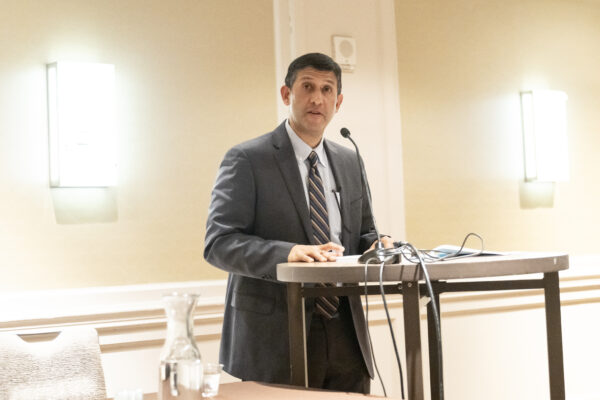After years of globalization, the so-called “Washington Consensus” is no more. Today, we are witnessing a revival of nationalism globally in response to the economic and cultural impact of trade and migration. In a new age of nations, how we tell national stories will become more important than ever. This is especially true for democracies. As Richard Slotkin has recently written, national stories enable “a diverse and contentious population, dispersed over a vast and varied country, to think of itself as a community and form a broad political consensus.” Absent that consensus, Americans are less likely to see their political opponents as fellow citizens and more likely to treat them as outsiders and enemies.

Johann Neem delivered the inaugural James M. Banner, Jr., Lecture on the State of the Discipline of History on January 4, 2025. Marc Monaghan
Despite the importance and need for national history right now, historians disagree profoundly on the narratives to offer Americans. Much like other Americans, historians are divided by politics and culture. In recent synthetic works, we find historians offering three distinct narratives, each with its own politics and each providing Americans a different civic story.
The first, perhaps the dominant, paradigm among professional historians is what I refer to as the “post-American” turn in US history, a turn that reflects some progressive historians’ deep frustration with Americans’ unwillingness to confront the ongoing legacies of racism and other forms of inequality. I call these historians “post-American” because their narratives paint a stark and dark picture of American history in which the past—both the actual past and historical writing about it—must be overcome to clear space for something better.
For example, in The Rediscovery of America: Native Peoples and the Unmaking of U.S. History (2023), Ned Blackhawk argues that because “American democracy arose from the dispossession of American Indians,” its history cannot be a resource for “the challenges of our time—racial strife, climate crisis, and domestic and global inequities, among others.” Americans must instead start “building an alternate American story.” To Blackhawk, the American past is usable only to the extent that it provides a list of wrongs that current and future generations must learn from and overcome.
In recent synthetic works, we find historians offering three distinct narratives.
In Illiberal America: A History (2024), Steven Hahn argues that illiberalism—racism, sexism, other forms of exclusion—are the defining elements of American history, while American liberalism is an invented tradition. In American history, illiberal ideas and practices serve as the “central fields of political and cultural force.” Illiberalism thus becomes, for Hahn, the constitutive feature of American history. “That is our history rather than its inventions, which we ignore at our peril,” Hahn concludes. For historians who rely on a similar framing, the American past, rather than being a resource for the country today, stands in the way of the United States becoming a more egalitarian and just society.
Numerous conservative historians highlight the radical implications of such a turn. For example, Allen C. Guelzo criticizes historians “whose ideology leads them to cast the American experiment in as grim a shade as possible, so that the way can be made over the ruins of the republic for some imagined new order which, in the end, turns out to be only a new tribalism.” In response, conservatives instead offer what I call a “hyper-American” counternarrative in which the country’s best qualities become its constitutive features while its wrongs—including slavery and racial inequality—are contingent and secondary. While conservative historians are a minority within the discipline, given their influence among movement conservatives and Republican Party leaders, their influence greatly exceeds their number.
Wilfred M. McClay offers a detailed analysis of some of the aspirations of hyper-American historians in Land of Hope: An Invitation to the Great American Story (2019). To McClay, one purpose of history is to offer Americans a story of themselves. Because Americans are not bound by blood, language, or religion, it is essential that they have a “a shared story, a shared history” to sustain “national identity.” Such a history must cultivate patriotism and thus must balance teaching about America’s wrongs with stories that inspire love. McClay rejects progressive historians’ premise that the country’s flaws are its defining features. All human beings and all countries “are flawed,” which is why we must approach people in the past with “criticism” but also “generosity.” Too often, he writes, generosity is missing, leading contemporaries “to condescend toward the past.” Writing the history of one’s nation, he argues, is “a patriotic endeavor as well as a scholarly one.”
Some hyper-American historians question the epistemological assumptions of modern historiography. Influenced both by classical ideas of history as exemplary and edifying (rather than explanatory) and by Leo Strauss’s rejection of historicism in favor of natural law, these historians emphasize the constant over the contingent. Guelzo believes that historians have not fully recognized the “rejection of natural rights constitutionalism as Progressivism’s master flaw” and calls for “natural law history.” Richard Samuelson asks whether historians’ assumptions about change over time overlook what history might really teach us: “To accept that the American Right is arguing in good faith is to admit that human nature is rather more robust than the Left can allow, and hence, that not all that much change is possible, or at least, that that is a quite plausible way of making sense of the human condition.”
The hyper-American commitment to natural law history makes controversies over America’s founding fraught. In the introduction to Hillsdale College’s 1776 Curriculum, the college’s president, political scientist Larry P. Arnn, writes that because the Declaration of Independence asserts that “human equality is grounded in the nature of things . . . a controversy about the founding is a controversy about our understanding of ourselves and nature and therefore of everything.” (Arnn reiterated these claims in the first of a series of videos that Hillsdale is making in partnership with the White House to recognize America’s 250th anniversary.)
Between the post-American and hyper-American paradigms is what I call “mainstream” American history because it reflects the historical sensibility of most Americans regardless of race, ethnicity, or party affiliation. It emerged in the wake of earlier history culture wars following the 1960s. It combines a narrative of progress with acknowledgments of America’s wrongs and an emphasis on struggles for justice and equality. To mainstream historians, the story of America is that of an unfinished experiment. Unlike post-American historians, mainstream historians see the past as a resource; unlike hyper-American historians, they offer a story of progress through struggle.
Jill Lepore offers a mainstream story in her synthesis These Truths (2018). Since the revolution, Lepore argues, the story of America has been about debates over equality, rights, and popular sovereignty. Her narrative chronicles how Americans have sought—and failed—to achieve these ideals and how our understanding of them changed over time. American history includes “a great deal of anguish . . . and more hypocrisy” but is not reducible to it. “Some American history books fail to criticize the United States; others do nothing but,” she writes. Instead, she urges Americans to see the past as composed of shared “truths” that are neither an “act of God” nor “lies.” She considers American history “an uneasy path,” but she believes that if we learn from the past, we can continue down a path to bring the country closer to its founding ideals.
Political scientist and intellectual historian Melvin L. Rogers offers a similar account in The Darkened Light of Faith: Race, Democracy, and Freedom in African American Political Thought (2023). All political entities, including the United States, are, Rogers writes, “ethical ventures. Contained within them are traditions and ways of being, sometimes at odds, which not only reflect the standing of persons but also guide how to treat others with whom we share society.” Unlike post-American historians, Rogers emphasizes Black writers who believed that the quest for racial equality “must belong to a familiar horizon,” so that the transformation of society can be understood by both Black and white Americans as emerging from within a shared world rather than “at odds with the culture at large.”
Most Americans still see the past through the lens of mainstream history, but that could change.
Most Americans still see the past through the lens of mainstream history, but that could change under the second Trump administration. Trump is deploying state power to impose an extreme version of the conservative, hyper-American narrative. On January 29, 2025, Trump issued an executive order on “Ending Radical Indoctrination in K–12 Schooling.” In that same order, Trump reestablished the 1776 Commission to promote “patriotic education.” In another executive order on March 27, Trump accused historians of “a concerted and widespread effort to rewrite our Nation’s history, replacing objective facts with a distorted narrative driven by ideology rather than truth” and required the Smithsonian Institution and all Department of the Interior historical sites to avoid “descriptions, depictions, or other content that inappropriately disparage Americans past or living” and “instead focus on the greatness of the achievements and progress of the American people.”
In response to Trump’s orders, executive agencies have rewritten public interpretations of the past, even when doing so erases historical facts. The administration has encouraged removing references to the history of Black Americans, women, and other minorities, even when those references have nothing to do with so-called “woke” interpretations of the past. It has ordered the National Park Service to put up signs asking park visitors to report information that portrays American history negatively. As Heather Cox Richardson wrote about Trump’s approach to history, “The idea that we had a perfect past that needs to be recovered is an ideology in service to an authoritarian, strongman, and one of the things you see with the rise of a strongman is the attempt to destroy real history.”
The mainstream story also depends on America being considered an unfinished experiment in self-government, but Trump has undermined the rule of law and embraced violence and cruelty as political tools. If American democracy today is not a living tradition but a historical artifact, the underlying assumptions for the mainstream story no longer hold. In response to Trump’s actions, we can imagine that post-American historians will double down on their interpretation of American history. The result may be culture wars like we have never seen, leaving less room for mainstream historians and teachers.
We thus enter a new age of nations deeply divided, making it difficult to cultivate the cultural solidarity necessary for democratic politics and to resist efforts to overturn the Constitution. The stakes are immense. Trump’s autocratic aspirations are not the only threat to American democracy. As Quinn Slobodian argues, many of America’s wealthiest cheer on the effort of the Department of Government Efficiency (DOGE) to incapacitate the American state in order to liberate “a ‘patchwork’ of private entities . . . governed by . . . technomonarchies.” In both cases, powerful actors are seeking to transform popular sovereignty into private power. To sustain democracy, we need to be a people, and to be a people, we need to share not just the present but also the past.
Johann Neem is professor of history at Western Washington University. This essay is adapted and updated from the inaugural James M. Banner, Jr., Lecture on the State of the Discipline of History, delivered at the 2025 AHA annual meeting. A fuller articulation of his argument is forthcoming in the journal Critical Historical Studies.
This work is licensed under a Creative Commons Attribution-NonCommercial-NoDerivatives 4.0 International License. Attribution must provide author name, article title, Perspectives on History, date of publication, and a link to this page. This license applies only to the article, not to text or images used here by permission.
